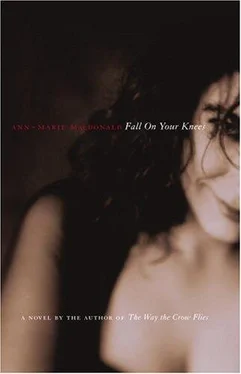“How is the clarinet going, Ralph?” she enquires.
“I’ve been practising” —
“Good, are you —?”
“Are you —? sorry —”
“Sorry.”
Smile.
“Are you still able to come over Sunday evening?” asks Ralph.
“Oh yes. May I bring the girls?”
“Of course, that’d be grand.”
Smile.
Mercedes reflects, not for the first time, that Ralph’s shiny brown eyes and sandy curls are somehow more pleasing than Valentino’s turban and charcoal glowers. Perhaps it’s because, if she reached out right now, she could touch Ralph. She blushes afresh and fumbles for the roast. Ralph drops it.
They’ve known one another all their lives, but suddenly over the past few months they’ve become terribly polite. It is a change that is not lost on Mrs Luvovitz, who is taking inventory across the aisle.
Mercedes is a good girl. A wonderful girl. I helped bring her into this world. I loved her mother like a daughter. But.
The problem is, if Mr and Mrs Luvovitz are to have grandchildren — Jewish grandchildren — well, it can’t be a shayna Catholic maidela , now can it?
“Relax,” Benny has told her.
“How can I relax? You want a Catholic grandchild?”
“A grandchild would be nice.”
Mrs Luvovitz gets choked up and can’t continue the argument. Benny says, “Come here, come here.”
She does. He says, “You want he should go away to school, and you want he should stay home.” She nods. He says, “You want he should be a doctor, and you want he should be a grocer.” She nods again, smiling now through tears. “And,” says Benny, “he should marry a nice Jewish girl and move into a house down the street.” She nods, stuffing a hanky in between his shoulder and her nose.
“You know, liebkeit , we’re the ones who came here. If we’d stayed in the Old Country there’d be plenty of nice Jewish girls. It’s not Ralph’s fault we made him be born here.” He pauses. “And it’s not his fault that….”
But he doesn’t have to continue. They both know. If Abe and Rudy had not been killed in the war, Mrs Luvovitz would not have such a problem letting Ralph marry Mercedes.
Over the tins of Dutch cleanser, Mrs Luvovitz watches Mercedes count out the money for Ralph and she watches him meticulously place it in the cash register. She sees him slip a chocolate rosebud into Mercedes’ hand before she leaves.
Mercedes exits Luvovitz’s Kosher Canadian feeling light-headed. Maintaining the pink glow on her cheeks for several blocks is the thought of what her and Ralph’s children would look like. Mercedes Luvovitz. Mrs Ralph Luvovitz. Their children would be Catholic, of course.
Mercedes indulges herself until King Street, then reins in her thoughts and remembers to open her umbrella. I wonder if Frances and Lily went on their picnic. I hope not, in this weather.
She turns onto Water Street and sees that Daddy is not yet home. Just as well. I feel like a little lie-down before starting supper.
Mercedes mounts the stairs to her room. The house is quiet. Lily and Frances must have gone on their picnic after all. It’s sweet of Frances to play with Lily so much — it means Lily’s not constantly on my hands — but I could wish Frances had a friend her own age. A nice one.
Mercedes lies down on her perfectly made bed, and allows her eyes to travel contentedly about her room. She has only fine things. Books. On her bedside table she has framed the old photograph of Mumma and Daddy in the archway. And safely hidden is the one surviving photograph of Kathleen — hmm, what’s it doing on the floor, it’s always tucked inside Jane Eyre where Daddy won’t have to come across it. Mercedes reaches down, picks up the photo and puts it on her bedside table. She’ll tuck it back into the book after she has a little zizz.
Mercedes’ eyes come drowsily to rest on the wall above her dresser where she has hung the portrait of Our Lady appearing to Bernadette in the grotto at Lourdes. Yellow roses sprout between the toes of Our Lady, and arranged in a halo about her head are the words she said to Bernadette, “I am the Immaculate Conception.” A stream runs between them. The stream that became the healing waters of Lourdes and now provides three-times-nine thousand gallons every day. Our Lady appeared to Bernadette three-times-six times. She told Bernadette three times to drink from the stream, which Bernadette did after throwing away the first three handfuls of water. Our Lady told her three secrets that Bernadette carried to the grave. Bernadette escaped all the publicity by becoming a nun. In the convent she helped out in the hospital and the chapel and struggled to control her lifelong bad temper. When asked what she was doing, Bernadette replied, “Getting on with my work: being ill.” Three days after the Feast of the Immaculate Conception she became bedridden. At three-times-twelve years old she died of asthma, tuberculosis and a tumour on the knee. She received extreme unction three times. Three nuns knelt by her at her death and now three million faithful a year flock to three basilicas at Lourdes, where the waters occasionally effect a miraculous cure.
Mercedes has become very sleepy thinking about Bernadette. As her eyes drift down from the picture they naturally fall upon the figurine of the dear Old-Fashioned Girl. Mercedes’ eyes lurch open. Diabolical.
The Old-Fashioned Girl has a parasol for a head and a head for a parasol. She is daintily holding up her own head of ringlets to the sun while the insensate yellow parasol is implanted in the empty neck like a flag. Frances .
Mercedes blinks back tears. It’s always like this — the minute I have something good, something clean. She goes to the dresser, tidying her tears with a thin trembling wrist.
She examines the body. The pieces have been glued like that, there’s no fixing this. At least not now. What to do with it, where to put it in the meantime where it won’t be like an obscene smell, invisible yet oppressive. The hope chest. It’s been kept locked ever since Frances dressed Trixie in the baptismal gown. Mercedes has the key.
She picks up the disfigurine without looking at it. It tinkles briefly. On the way, she picks up the photo of Kathleen, intending to replace it between the leaves of Jane Eyre , but Jane has flown. She is not on the shelf near the window. She is nowhere to be seen. Frances must have borrowed her. Again.
First things first. Mercedes will hunt for the book later. She puts Kathleen in her pocket and walks to the foot of the attic stairs. Listens. Silence. She mounts the stairs.
The attic is so empty. Nothing but the hope chest. Even the attic’s one other distinguishing feature is an absence: a criss-cross halfway up the wall where a crucifix used to be. Mercedes remembers when this was Kathleen’s bedroom. Before she died here, peacefully in her sleep.
The hope chest is a good place to store things like the ruined Old-Fashioned Girl because the attic is so separate from the rest of the house. In a state of perpetual quarantine. It’s really an abandoned room. That’s why the sad feeling here, Mercedes supposes. Sad like a deconsecrated church. Maybe I’ll put a crucifix back up here if I think of it next time. Or no, because then you couldn’t store anything up here like the ruined Old-Fashioned Girl. Mercedes sees the practical benefit of having a non-room in the house.
She opens the hope chest. The cedar smell clouds up soft and alive, resurrecting an old grief. Mercedes has no wish to linger here or to rummage in the past. She takes what is to hand — the baptismal gown is at the top of the pile from the Trixie incident — and wraps the Old-Fashioned Girl in it. After what the garment has been through this can hardly be considered a desecration. She closes the lid and locks it. She stands for a moment in the emptiest of rooms. Then leaves, quietly closing the door behind her.
Читать дальше












